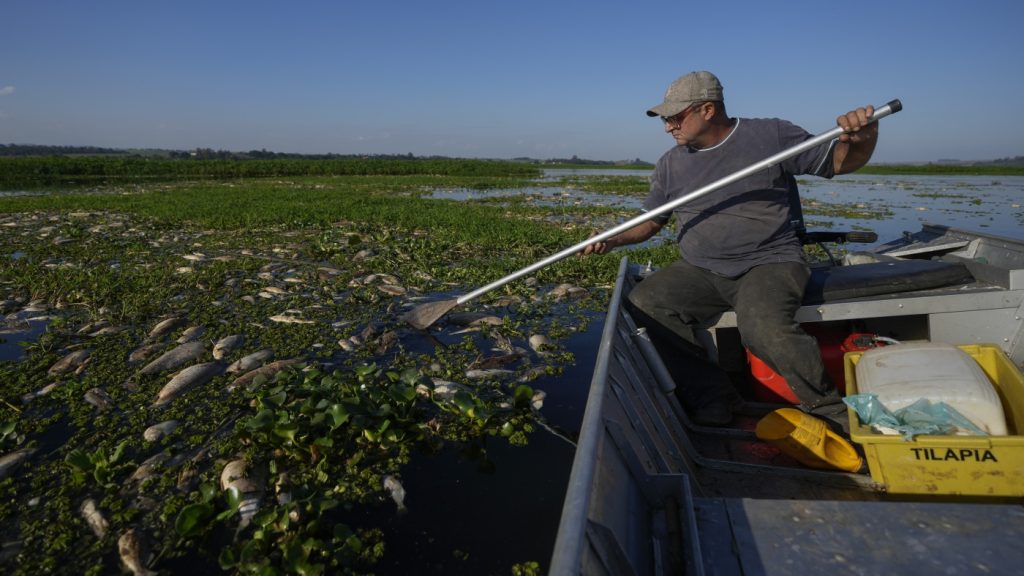Fisherman Alan Bellucci examines dead fish on the banks of the Piracicaba River in the rural town of Piracicaba, Sao Paulo state, Brazil, on Wednesday. State environmental authorities claim the fish died because of illegal dumping of industrial waste into the river.
Andre Penner/AP
Hide caption
Toggle caption
Andre Penner/AP
TANKÁ, Brazil — Tons of fish have died in one of Brazil’s major rivers in the state of Sao Paulo due to suspected illegal dumping of industrial waste from a sugar and ethanol plant, environmental authorities and prosecutors said Wednesday.
Sao Paulo prosecutors said in a statement that preliminary analysis estimated that between 10 and 20 tonnes of fish had died in the Piracicaba river in southeast Brazil.
Prosecutors said initial investigations pointed to “irregular wastewater discharges” from Estiva’s San Jose plant in the Rio das Pedras area that reached a stream that flows into the Piracicaba river.
Estiva, which operates the plant, did not respond to multiple requests for comment from The Associated Press.
“It will take years for the environment to recover,” Adriano Queiroz, director of licensing at São Paulo’s environment agency, said in a video call, adding that the impact on biodiversity was significant, given the number of fish killed and the range of species affected.
The Piracicaba River crosses the protected area of Tancua, also known as São Paulo’s mini Pantanal, named after the tropical wetlands famous for their abundant wildlife and spectacular natural scenery. Its drainage basin covers an area of 12,531 square kilometers.
On Wednesday, carpets of dead fish covered the waterway and were strewn along the river.
“This sad environmental disaster has touched everyone’s hearts because of the severity and scope of its impacts,” the prosecutor said, adding that the situation for fishermen and local communities was also “deeply worrying.”
Prosecutors have requested a detailed report on the condition of the water and are waiting for more technical information before moving forward with the next steps on civil and criminal charges.
Sao Paulo’s public security chief said in a statement that police were investigating whether environmental crimes had been committed.
The company risks facing heavy fines.
The São Paulo state environmental agency, known in Portuguese as CETESB, first received reports on July 7 of mass fish deaths in the river and a strong foul odor.
On the same day, the agency asked the Salto Grande hydroelectric plant to increase water releases to dilute the pollutants.
By July 9, data showed an increase in dissolved oxygen, creating favorable conditions for fish survival, according to CETESB.
But reports have emerged of another fish die-off in Tancua, about 60 kilometers (37 miles) from the city of Piracicaba, where news of the fish die-off first broke.
The Piracicaba River flows through one of the oldest inhabited areas of Sao Paulo state, according to Brazil’s National Statistics Institute, and was used as a navigation route for small steamboats and to provide water for sugar cane and coffee plantations.
Last year, a severe drought in the Amazon caused large numbers of fish to die.




